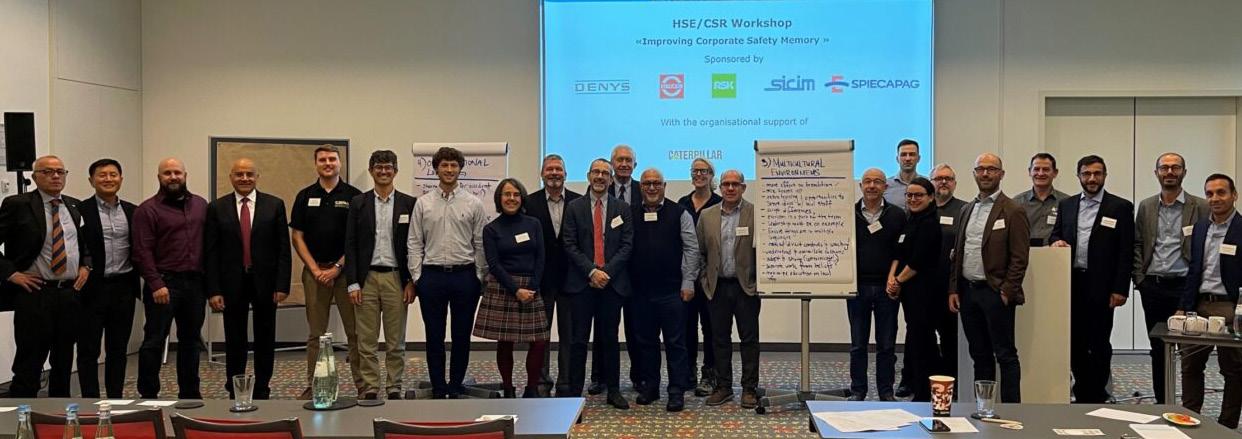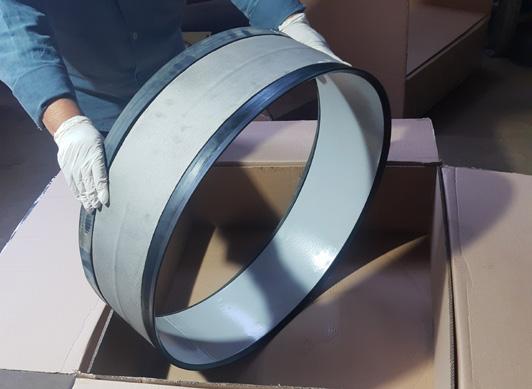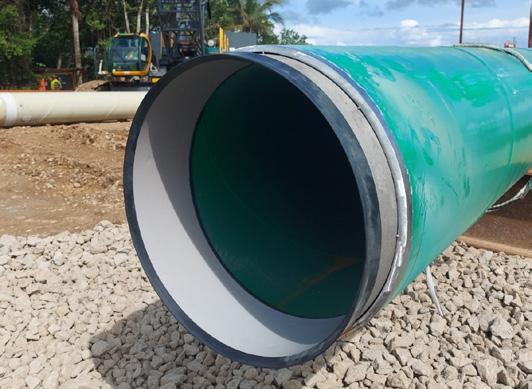
5 minute read
Health, Safety, the Environment & CSR
from IPLOCA Newsletter 97
by Pedemex BV
News from the HSE & CSR Committee
Mustafa Aslan retired last September from both Tekfen and the HSE & CSR Committee, having joined the committee on 25 April 2022.
Baris Kavukcu, also working for Tekfen, will replace Mustafa and will be officially introduced to the Committee in April 2024 as he couldn’t join the meeting in Munich. A Turkish national, Baris has 18 years of experience with major international oil & gas projects on project management, quality and HES management and project completion/handover.
A combined workshop with PLCA - still to be confirmed – is being planned for October/November 2024 in Houston. The theme will be: “Man/Machinery Interface”, working safely with machines.
Update on the HSE & CSR Workshop in Munich

The workshop, held on 24 October, was led by Diana Anghel from Caterpillar Safety Services, Fred Sherratt from the Construction Safety Research Alliance (CSRA) and Logan Perry from the University of Nebraska.
IPLOCA warmly thanks Benet Chan and Kevin Parker for their help with the organisation, and special thanks go to the members of the HSE & CSR Committee who sponsored this workshop, namely Denys, RSK, SICIM, Spiecapag and MAX STREICHER.
The morning provided the opportunity for attendees to hear about the latest learnings on how organisations can ‘learn’ from past incidents/events and how companies can improve their safety culture and reduce serious injury or fatality (SIF) events.
In the afternoon, participants split into breakout rooms to work with the following questions:
1. How can we better determine what good risk perception looks like?
2. What work tasks could we reorganise to enable direct controls for the most common STKY (Stuff that Kills You) hazards?
3. How can we improve safety in cross-cultural / multicultural work environments?
4. In what ways are we learning about safety and how can we improve?
Answers to these questions may be found on the event’s webpage: www.iploca.com/event/iploca-hse-workshop-2023
Innovation
Novel Construction Fall Session
The Fall Novel Construction Meeting was held at the Holiday Inn – Westpark hotel in Munich, Germany, on Wednesday, 25 and Thursday, 26 October.
More than 75 delegates from across the world participated in the event. The week’s programme also included the HSE Workshop about improving corporate safety memory (see page 31). On Wednesday morning, presentations were made by IPLOCA members and guest speakers on their innovative developments and initiatives with the aim of improving pipeline design and construction. The following subjects were presented:
Bending Machine Safe Hook Support - IPLOCA Health & Safety Award Winner 2023
Guido Soffiantini & Vincenzo Petrone, SICIM S.p.A.
- Hydrogen Goes Public
Josef Wittenzellner, MAX STREICHER GmbH
- Near Surface Geophysics in Onshore Pipeline Design –Petrobras’ Experience
Ana Cecilia Soares, Petrobras
- Fast, Safe, and Low-Risk Construction of Internally Coated Pipelines*
Ryan Sears, Lined Pipe Systems
- Hyperloop Ambitions through the Mass Production of Large Diameter Hyperloop Tubes
Mehmet Orgen, Erciyas Steel Pipe
- Pipeline Monitoring using Distributed Fiber Optic Sensing - State of the Art and Basic Concepts
Cristian Grecco, Omnisens SA
- MONTIPower – Enviromentally Friendly Technologies for Surface Preparation*
Martin Durcik, MONTI Werkzeuge GmbH
* Articles on these initiatives follow this report.
Copies of all the presentations are available at: www.iploca.com/iploca-novel-construction-fall-session-2023 .
On Wednesday afternoon and Thursday morning, group work sessions and presentations took place to review the existing and the new chapters that need to be completed, as well as additional subjects to be developed for “The Road to Success” app. We thank everyone who participated in this Fall Meeting.
If you would like to take part in the Novel Construction Initiative, please contact the appropriate group leader or gregoire.demontmollin@iploca.com
We look forward to our next session which is planned for 24 April 2024 . The location and hotel are yet to be defined.
Fast, Safe, and Low-Risk Construction of Internally Coated Pipelines
Ryan Sears, CEO, Lined Pipe Systems, U.S.A.
Imagine a pipeline project with dozens of 500+m pipe strings left alongside the trench, and tie-in crews more than 40km behind the mainline welding crew.
You might wonder why they don’t simply lower the strings into the trench, do the tie-ins, and bury the pipe? The reason is that workers still need to enter the strings and perform the painstakingly slow, error-prone, and dangerous process of manually coating the interior of each weld joint. This is the reality for several desalinated water pipelines being constructed right now. But other contractors have learned it doesn’t have to be this way. Lined Pipe Systems’ FlexSleeve® allows for standard, fast construction of internally coated pipelines and greatly reduces liabilities to schedule, joint quality, and safety. FlexSleeve® is a corrosion and heat resistant internal sleeve that prevents liquids from corroding the bare steel of the weld zone. It’s inserted into pipe ends during construction and it eliminates the need to abrasive blast, clean, coat, and inspect the interior of each joint. Once the welding is done, the joint interior is protected and ready to go.
Contractors that have experienced the nightmare of manual or robotic internal joint coatings are quick to understand FlexSleeve’s advantages and how the increased construction speed saves them money. One such contractor, OECI of Brazil, built a 28” dia. (DN700) x 92km water line and started off patching the joint interiors manually. After using FlexSleeve their productivity increased by 28%. OECI’s Procurement Manager, Gustavo Magalhaes, said, “Now at the end of the project we are asking ourselves what if we had invested in more FlexSleeves sooner? The results would have been even better.”

FlexSleeve® has also been tested for use with automatic welding using Qapqa’s external automatic welding system and a specialised internal lineup clamp. FlexSleeve serves as a backing ring and increases root pass speeds by more than 50% compared to welds without backing. No other construction method for internally coated pipelines comes close to matching the productivity levels of FlexSleeve®. Besides construction speed, FlexSleeve® eliminates significant quality risks. The process involved in achieving proper quality for a coating that will be subject to immersion at high pressure involves far more than many contractors realise.
Surface preparation includes grinding removal of irregular weld penetration, abrasive blasting, and cleanup of all dust for perfect cleanliness. The slightest speck of dust, sweat, etc. will usually lead to a coating failure down the line. Applying sufficient coating thickness is very challenging with a single coat. Paint curing times in widely varying steel temperatures often cause quality issues and delays. And all coatings must be inspected after the paint has cured. Compare that to FlexSleeve, where the coating is applied and 100% inspected in an environmentally-controlled shop setting.
Last but not least FlexSleeve® eliminates safety risks. Pipelines are a confined space and entry into long pipe strings for coating application presents serious safety hazards including toxic & flammable fumes, and difficult extraction of injured personnel – risks that can lead to fatalities if not managed properly. Internal weld sleeves have been successfully used in small diameter upstream oil & gas pipelines for more than 25 years in highly corrosive applications. The lightweight and flexible FlexSleeve® expands the use of internal weld sleeves to larger diameters with out-of-round pipe ends.
FlexSleeves have been used in pipelines transporting domestic water, produced water, and processed water for the oil & gas and mining industries in North and South America. They are currently available in diameters up to 60” (DN1500), and larger diameter projects are being evaluated. Lined Pipe Systems is headquartered near Houston, Texas and has a manufacturing facility in Belo Horizonte, Brazil.












